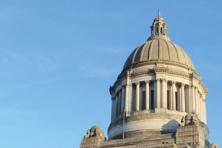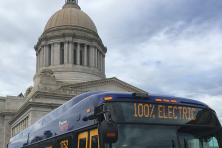This is part of a series of articles on Electrifying Transportation.
Last Monday, the King County Council unanimously passed a resolution sponsored by Councilmembers Dembowski and Kohl-Welles requesting a report on transitioning Metro to a zero emission or carbon neutral fleet. This is an exciting step in electrifying King County Metro’s substantial fleet, which includes over 1,500 buses that depend on diesel.
Under the leadership of Executive Dow Constantine, King County Metro has long expressed a repeated and sincere commitment to greening its fleet that is unique among agencies of its size. Electrification is a key part of Metro’s sustainability strategy, whether it’s operating a significant trolleybus fleet or the expansion of the Streetcar. Just this year, the agency rolled out three new battery electric buses, starting an important eastside pilot that is already demonstrating that electric buses work in our region.
Pursuing an aggressive transition to zero-emission coaches is a critical next step for the agency that will yield financial, climate, and air quality benefits—especially to communities disproportionately impacted by vehicle pollution.
Transit has substantial pollution reduction benefits—getting people into buses and out of cars pays major dividends from both a climate and air quality perspective. All told, transit in King County is responsible for 600,000 metric tons in avoided car emissions.
Unfortunately, even the cleanest diesel hybrid emits approximately 2 kg of CO2 per mile of travel. According to Councilmember Dembowski, this means that the agency’s current fleet is responsible for 114,000 metric tons of carbon emissions annually. More urgently, these buses emit a wide variety of other pollutants that directly contribute to lung disease—impacts that fall overwhelmingly on low income communities and communities of color. Battery buses would completely eliminate tailpipe emissions of greenhouse gases and co-pollutants.
Because of Washington’s cheap and largely clean power grid, electrification provides clear financial benefits for the county. As the price of oil grows, as all projections indicate it will, fuel costs will directly impact Metro’s bottom line. Cheaper and more stable electricity prices will ensure that diesel prices don’t cut service. When you add in lower maintenance costs, each one of these buses will save Metro $400,000 over its lifetime.
The resolution also includes a call for the creation of a stakeholder group to input into the transition plan. This is critically important, ensuring that communities and experts are able to weigh into the creation of an ambitious and just plan that serves the needs of King County residents and addresses the real climate challenge we face.
Twelve years ago, King County Metro became one of the first transit agencies to buy a hybrid electric bus. Today, nearly all of the buses the agency runs are hybrids, and the technology has become commonplace across the country. This resolution will ensure that Metro continues to drive innovation in public transit.





